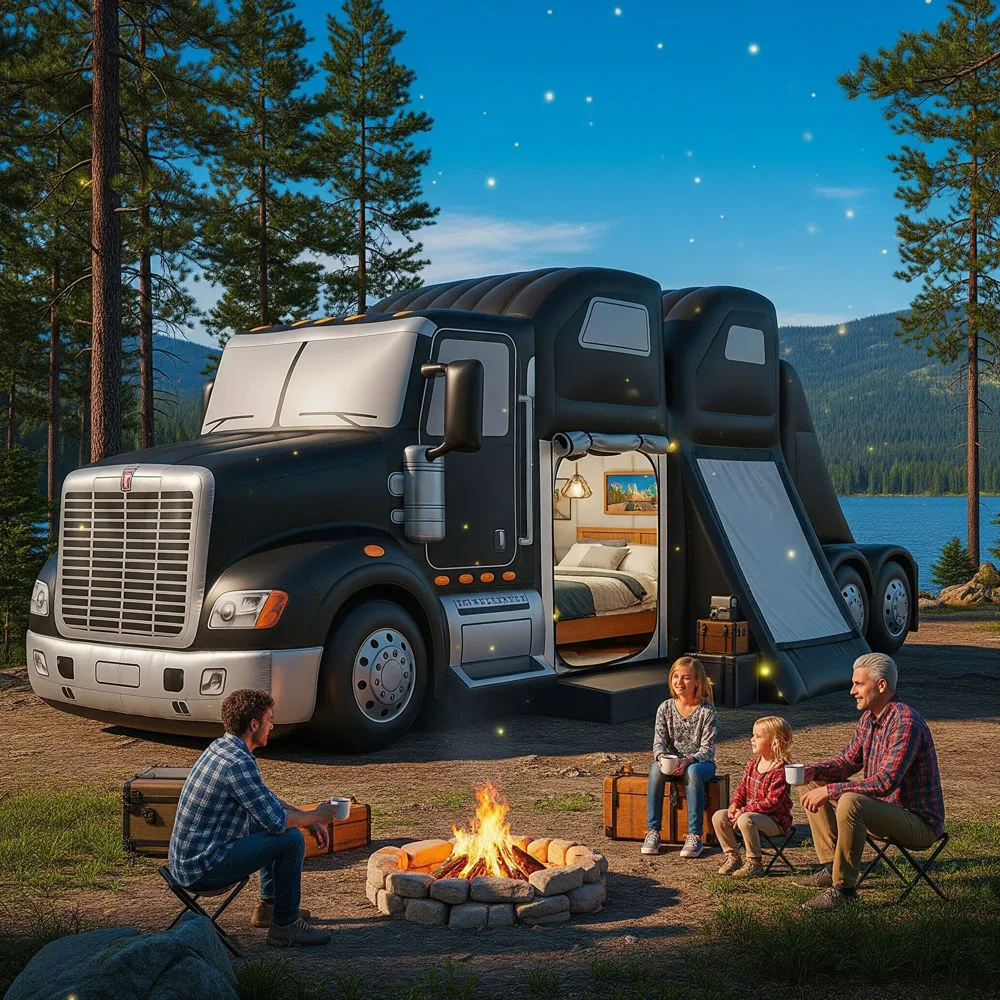The open road calls to many, but for professional truck drivers and adventure seekers alike, finding comfortable accommodation during long journeys can be challenging and expensive. Enter the semi truck camping tent, a game changing solution that transforms any parking area into a cozy outdoor retreat. This innovative camping gear has revolutionized how truckers and road trip enthusiasts approach rest and relaxation during their travels.
A semi truck camping tent offers unprecedented freedom and comfort, allowing drivers to escape cramped cab spaces and enjoy the great outdoors without the hefty costs of hotels or truck stops. Whether you’re a long haul trucker looking for better rest options or an adventurous traveler seeking unique camping experiences, understanding the world of truck camping tents can significantly enhance your journey.
What is a Semi Truck Camping Tent?
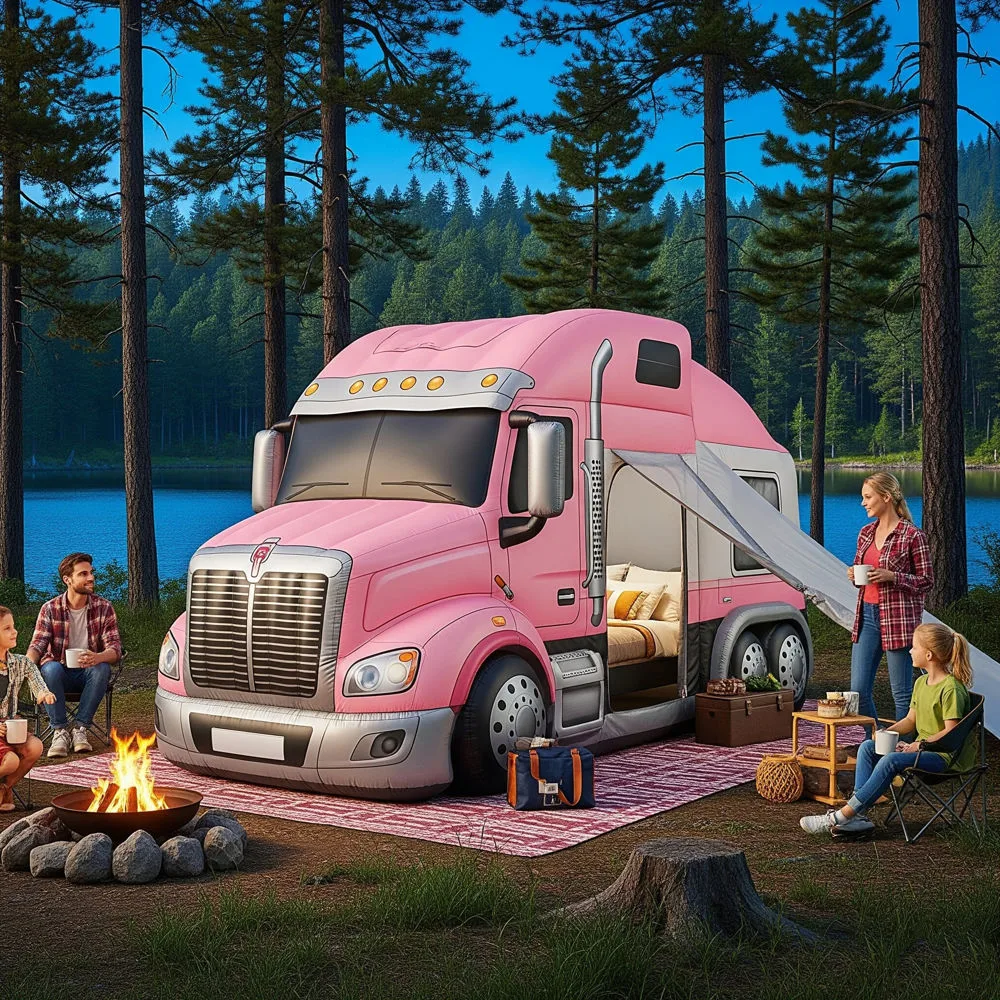
A semi truck camping tent is a specialized outdoor shelter designed specifically to work with semi trucks and large commercial vehicles. Unlike traditional camping tents that require flat ground and stakes, these innovative shelters are engineered to attach directly to trucks or utilize the unique space around these massive vehicles.
These tents come in various configurations, from simple awning style shelters that extend from the truck’s side to elaborate multi room setups that can accommodate multiple people. The key feature that sets a semi truck camping tent apart from regular camping gear is its ability to work with the truck’s existing structure, using the vehicle as both an anchor point and additional living space.
The concept emerged from the practical needs of long distance truckers who spend days or weeks on the road. Traditional camping gear simply wasn’t designed for the unique challenges of truck based camping, including limited setup space, the need for quick deployment, and the requirement to work around massive vehicles and their equipment.
Benefits of Using a Semi Truck Camping Tent
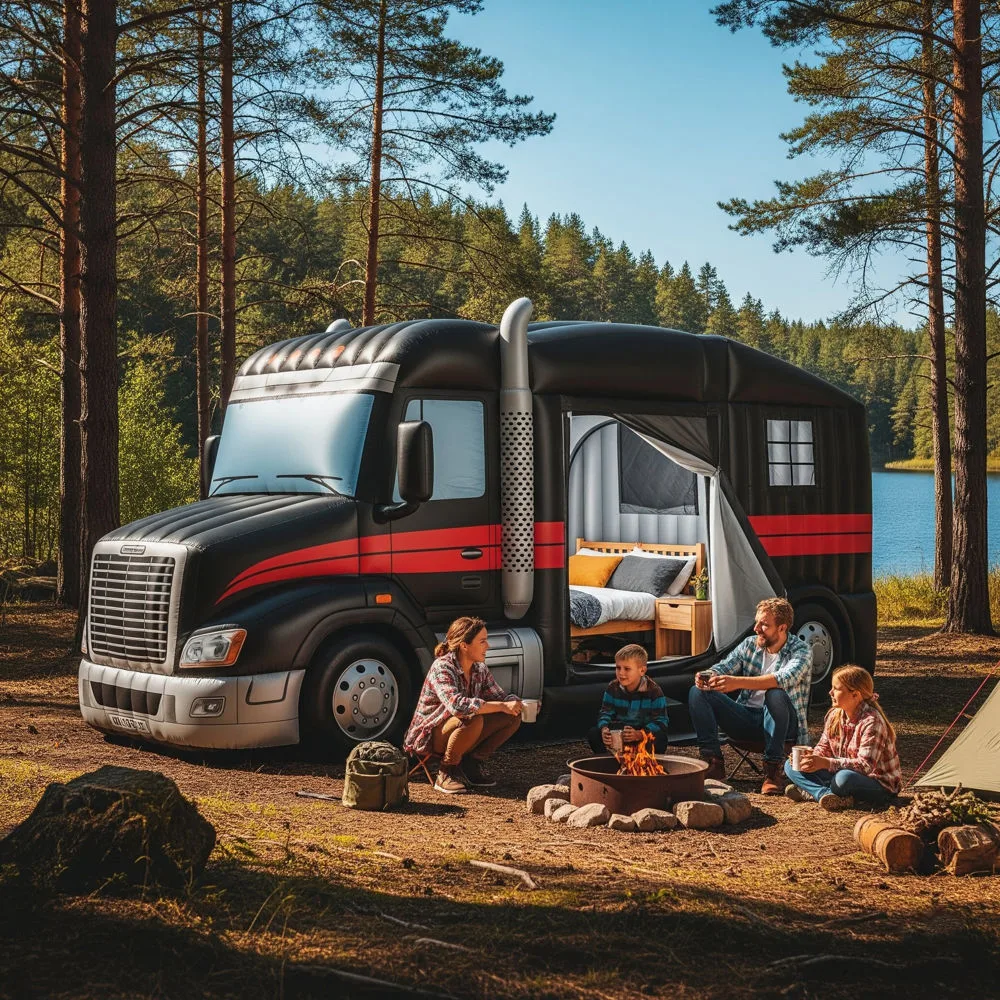
Enhanced Comfort and Privacy
One of the primary advantages of a semi truck camping tent is the dramatic improvement in comfort compared to sleeping in the truck cab. While modern truck sleepers have improved significantly, they still can’t match the spaciousness and fresh air circulation that a tent provides. A semi truck camping tent effectively doubles or triples your living space, giving you room to stand, stretch, and move freely.
Privacy is another crucial benefit. Truck stops and rest areas can be noisy and busy at all hours, but a tent provides a private sanctuary where you can relax without the constant distraction of passing traffic and other travelers. This enhanced privacy contributes to better sleep quality and overall mental well being during long journeys.
Cost Effectiveness
The financial benefits of using a semi truck camping tent cannot be overstated. Hotel costs for truck drivers can quickly add up, especially during extended trips. A single night at a truck friendly hotel can cost anywhere from $60 to $150 or more, while a quality camping tent pays for itself after just a few uses.
Beyond accommodation savings, truck camping allows you to prepare your own meals using portable cooking equipment, further reducing travel expenses. Many truckers report saving hundreds of dollars per month by incorporating camping into their travel routine.
Connection with Nature
Long distance driving can be isolating and mentally taxing. A semi truck camping tent provides an opportunity to step outside, breathe fresh air, and connect with the natural environment. This connection with nature has proven mental health benefits, including reduced stress, improved mood, and better sleep quality.
Many truckers find that spending time outdoors helps them decompress from the challenges of driving and dealing with traffic, regulations, and tight schedules. The simple act of sitting outside under the stars can provide a much needed mental reset.
Types of Semi Truck Camping Tents
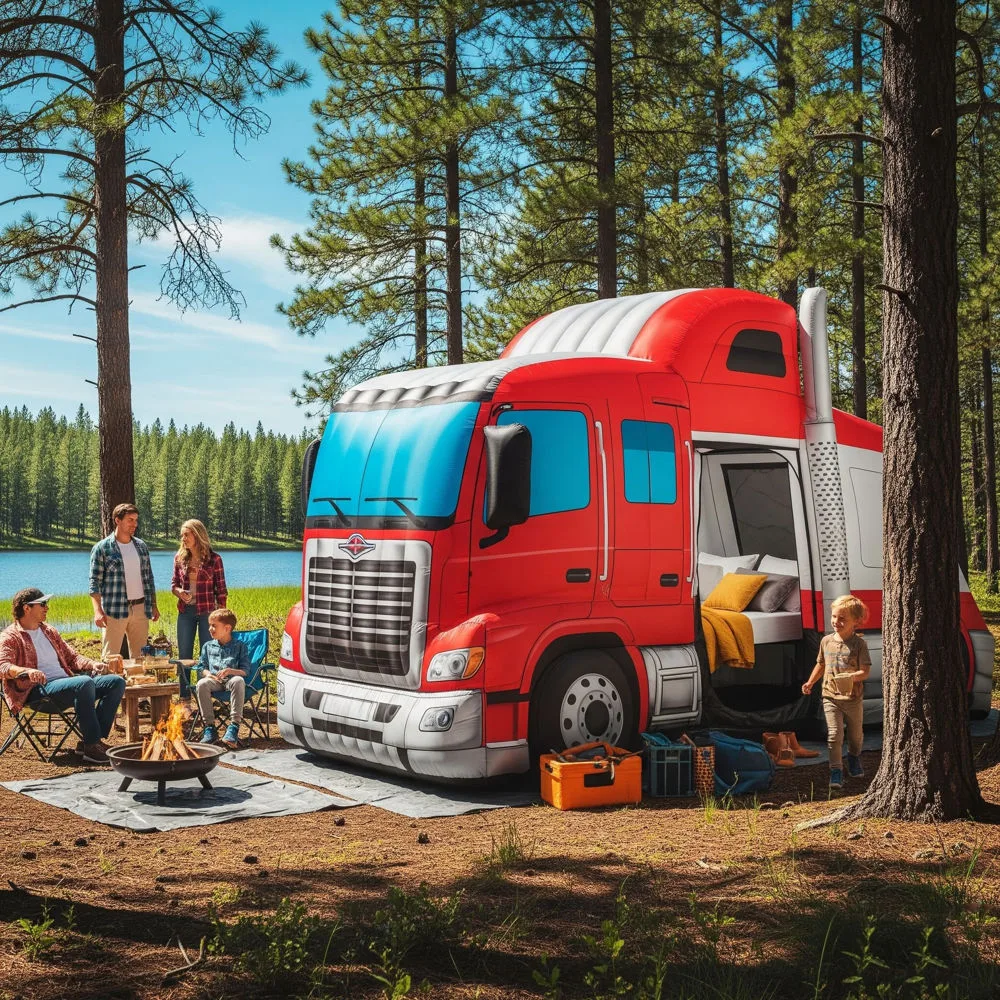
Awning Style Tents
Awning style tents are among the most popular choices for truck camping. These tents attach to the side of the truck and extend outward, creating a covered area that can serve as both shelter and additional living space. They’re relatively easy to set up and take down, making them ideal for truckers who need to move frequently.
The main advantage of awning style tents is their versatility. They can be used as a simple shade structure during the day and converted into a sleeping area at night. Many models include removable walls that can be added for privacy or removed for better airflow.
Freestanding Truck Tents
Freestanding tents are designed to work independently of the truck while still taking advantage of the vehicle’s presence. These tents are typically larger and more feature rich than awning styles, offering multiple rooms, vestibules, and enhanced weather protection.
The primary benefit of freestanding designs is their independence from the truck’s specific configuration. They can be set up at various distances from the vehicle and don’t require any attachment points on the truck itself. This makes them suitable for a wider range of truck types and configurations.
Hybrid Attachments
Hybrid semi truck camping tent designs combine elements of both awning and freestanding styles. These innovative tents might attach to the truck at one end while being independently supported at the other, or they might use the truck as a windbreak while maintaining their own structural integrity.
Hybrid designs often offer the best of both worlds, providing the convenience of truck attachment while maintaining the flexibility of independent setup. They’re particularly popular among truckers who frequently change routes or stop at different types of locations.
Essential Features to Look For
Weather Resistance
Weather resistance is perhaps the most critical feature to consider when selecting a semi truck camping tent. The tent must be able to withstand sudden weather changes, including rain, wind, and temperature fluctuations. Look for tents with waterproof ratings of at least 3,000mm for the floor and 1,500mm for the walls.
Quality weather resistance also includes reinforced seams, sturdy zippers, and durable guy lines. The tent should be able to handle moderate winds without collapsing or becoming damaged. Many truck camping tents include additional features like storm flaps and reinforced stress points to enhance weather protection.
Quick Setup and Takedown
Time is money for professional truckers, and a semi truck camping tent that takes too long to set up defeats the purpose. Look for tents that can be erected in 15 minutes or less by a single person. Features like color coded poles, simple clip systems, and clear instructions contribute to faster setup times.
Equally important is the takedown process. The tent should pack down compactly and fit easily in the truck’s storage compartments. Some tents come with custom storage bags designed to fit specific truck storage areas.
Durability and Materials
The harsh conditions of truck camping demand exceptional durability. Look for tents made from ripstop nylon or polyester with reinforced stress points and quality hardware. The frame should be constructed from aluminum or steel, depending on your weight and durability preferences.
Pay attention to the quality of zippers, as these are often the first component to fail in camping gear. YKK zippers are generally considered the gold standard for outdoor equipment and are worth the extra cost for their reliability and longevity.
Size and Capacity
Consider both the number of occupants and the amount of gear you need to store when selecting tent size. A semi truck camping tent should provide enough space for comfortable sleeping while leaving room for personal belongings and equipment.
Remember that larger tents require more setup time and storage space, so balance your space needs with practical considerations. Many truckers find that a tent designed for 2-3 people provides the ideal balance of comfort and practicality for solo camping.
Setting Up Your Semi Truck Camping Tent
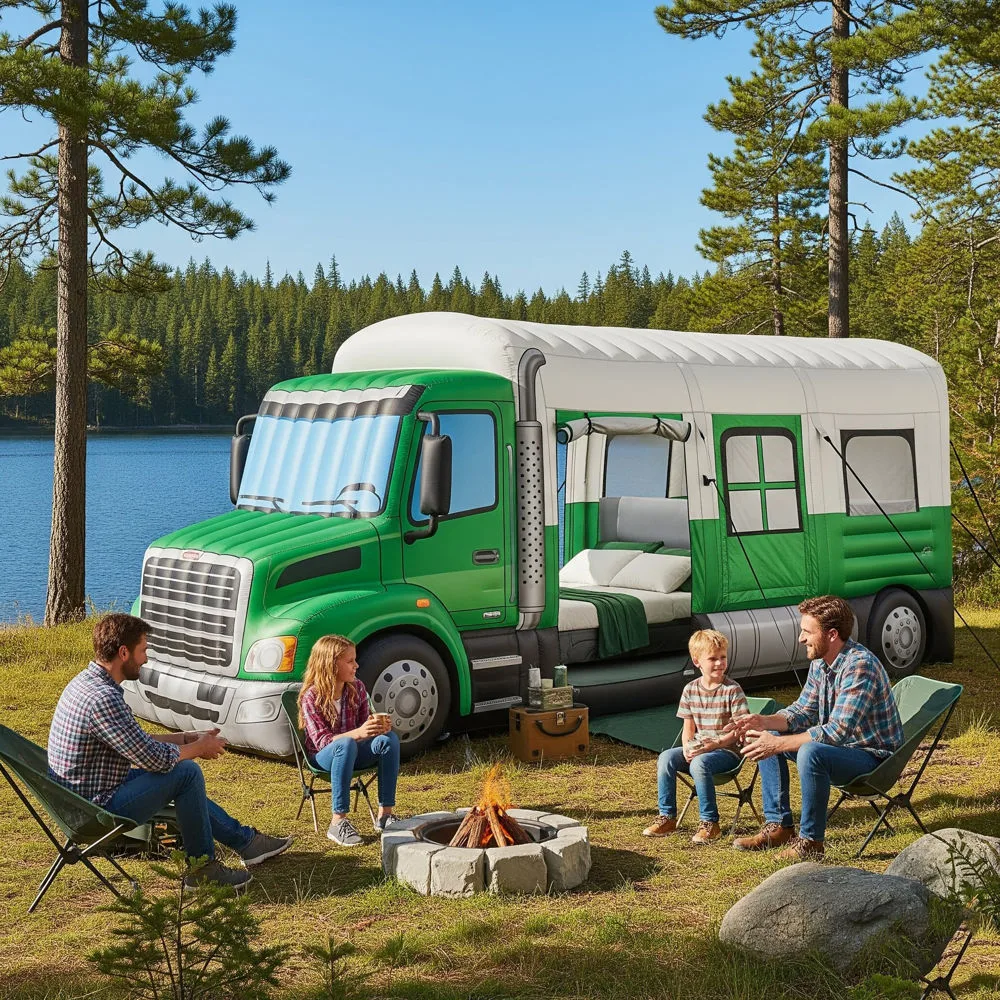
Choosing the Right Location
Location selection is crucial for a successful truck camping experience. Look for level ground when possible, though most truck camping tents are designed to work on slightly uneven surfaces. Avoid areas with obvious drainage issues or locations that might flood during rain.
Consider wind direction and protection when selecting your campsite. Position the tent to take advantage of natural windbreaks like trees or rock formations, but be mindful of potential hazards like falling branches or unstable terrain.
Safety Considerations
Safety should be your top priority when setting up camp. Ensure that your truck is properly parked and secured before beginning tent setup. Use wheel chocks and set the parking brake to prevent any vehicle movement during the night.
Be aware of your surroundings and local regulations. Some areas prohibit camping or have specific rules about overnight parking. Always check local laws and respect private property rights.
Step by Step Setup Guide
Begin by laying out all tent components and familiarizing yourself with the instructions. Sort poles by length and ensure you have all necessary stakes and guy lines. Clear the immediate area of any debris or obstacles that might interfere with setup.
Start with the tent footprint or ground sheet if your tent includes one. This protects the tent floor and provides an additional moisture barrier. Next, assemble the frame according to the manufacturer’s instructions, typically starting with the main structural poles and working toward smaller detail elements.
Attach the tent body to the frame, ensuring all clips and connections are secure. Many modern tents use color coding systems to make this process easier. Once the basic structure is complete, add the rainfly and secure all guy lines for optimal stability.
Maintenance and Care Tips
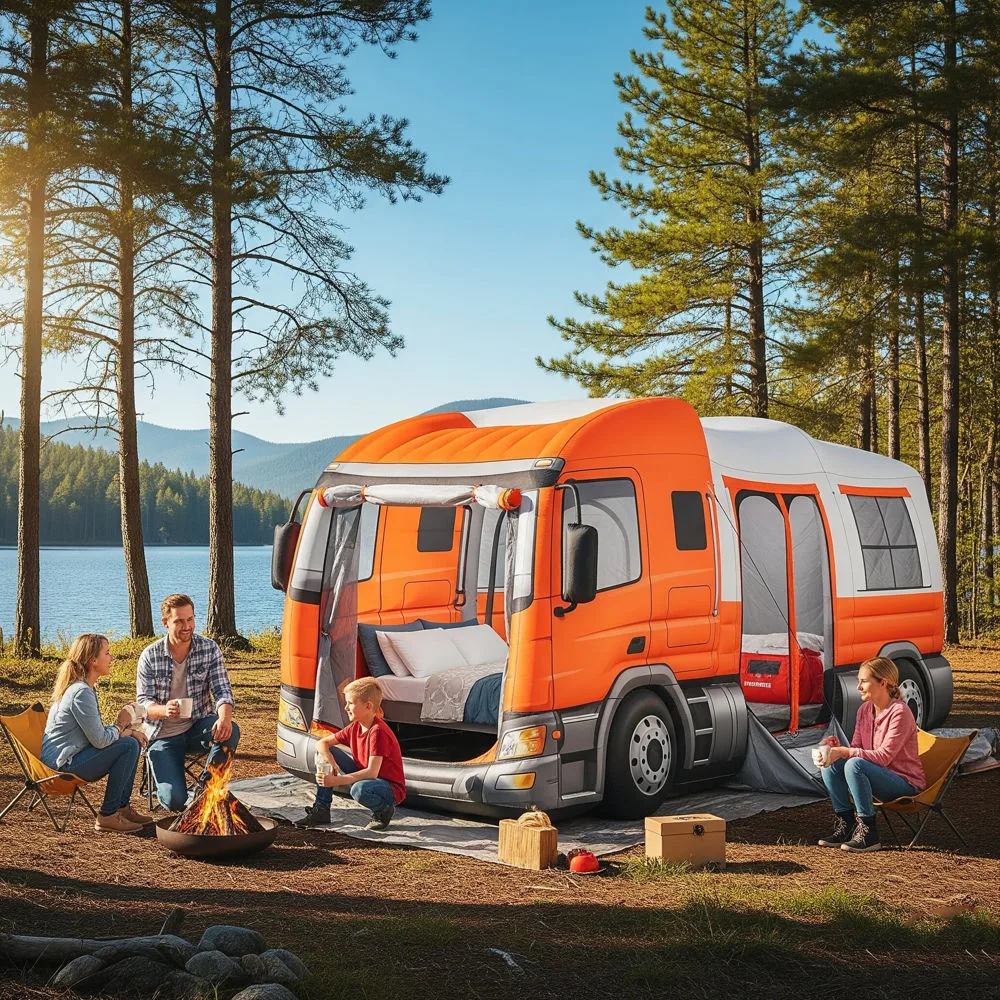
Cleaning and Storage
Proper maintenance significantly extends the life of your semi truck camping tent. After each use, shake out any debris and allow the tent to air dry completely before packing. Even small amounts of moisture can lead to mold and mildew during storage.
For deeper cleaning, use mild soap and water to spot clean stains and dirt. Avoid harsh detergents or bleach, which can damage waterproof coatings. Some tent fabrics can be machine washed on gentle cycles, but always check manufacturer recommendations first.
Store your tent in a cool, dry place away from direct sunlight. UV rays can degrade tent fabrics over time, even when the tent is packed away. Consider using a storage bag with UV protection or storing in a dark closet or storage compartment.
Regular Inspections
Develop a routine of inspecting your tent before and after each trip. Check for any signs of wear, including small tears, loose seams, or damaged zippers. Address minor issues immediately to prevent them from becoming major problems.
Pay special attention to high stress areas like pole sleeves, guy line attachment points, and floor corners. These areas experience the most wear and are most likely to develop problems first.
Repair and Replacement
Keep a basic repair kit with your camping gear, including tent patches, seam sealer, and spare guy lines. Many tent manufacturers offer repair services for major damage, which can be more cost effective than replacing the entire tent.
Know when to replace your tent. Signs that it’s time for a new semi truck camping tent include persistent leaks that can’t be repaired, frame damage that affects structural integrity, or excessive wear that compromises the tent’s performance.
Cost Analysis and Value
Initial Investment
The cost of a quality semi truck camping tent typically ranges from $200 to $800, depending on size, features, and brand. While this might seem expensive initially, the investment pays for itself quickly when compared to hotel costs.
Consider the total cost of ownership, including accessories like sleeping bags, camping chairs, and portable cooking equipment. A complete truck camping setup can be assembled for under $1,000, providing years of comfortable accommodation.
Long Term Savings
Professional truckers who use camping tents regularly report significant savings on accommodation costs. A driver who camps just two nights per week can save over $6,000 annually compared to hotel costs.
Beyond direct savings, truck camping can improve driver health and job satisfaction, potentially leading to better performance and career longevity. The ability to rest comfortably and maintain a connection with nature can reduce stress and improve overall well being.
Return on Investment
Most truck camping enthusiasts find that their semi truck camping tent pays for itself within the first month of regular use. The return on investment becomes even more attractive when considering the non monetary benefits like improved sleep quality and mental health.
Factor in the flexibility that camping provides, including the ability to stop at scenic locations or avoid crowded truck stops, and the value proposition becomes even more compelling.
Accessories and Additional Equipment
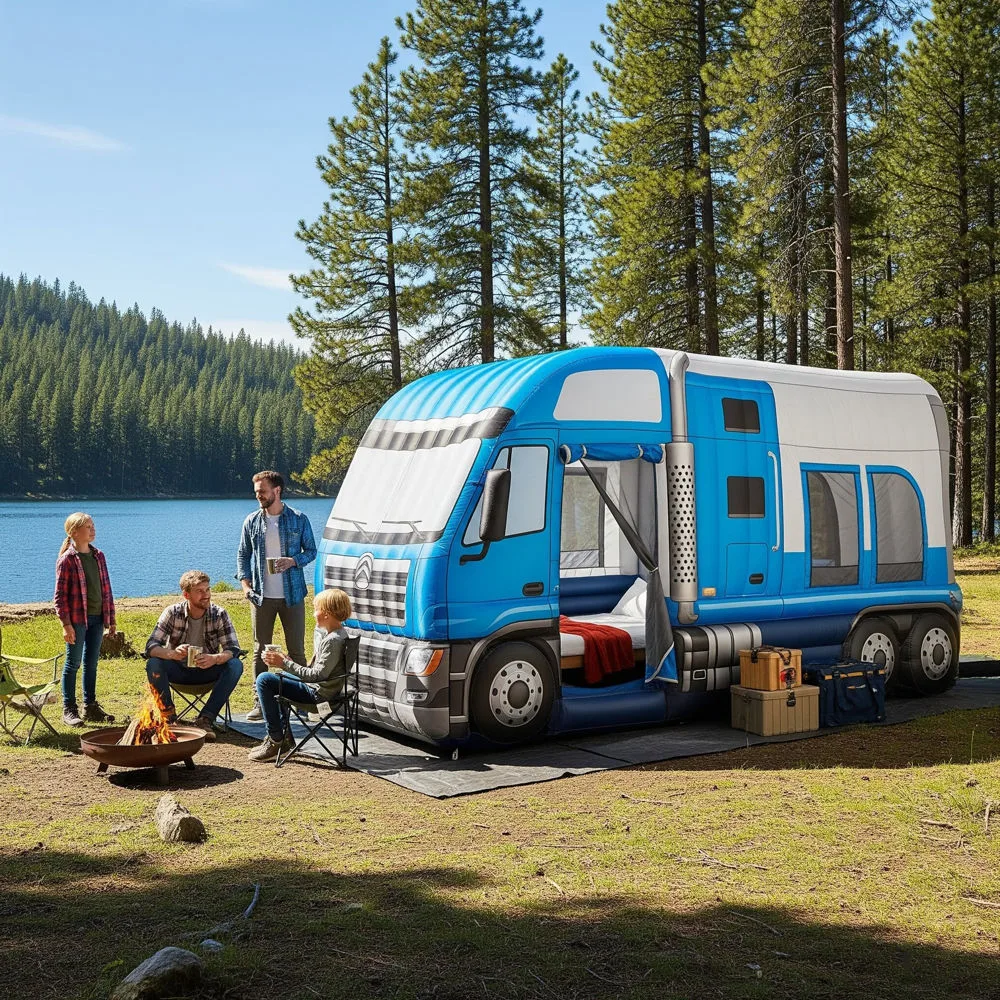
Sleeping Systems
A quality sleeping system is essential for comfortable truck camping. Look for sleeping bags rated for the temperatures you expect to encounter, and consider adding a sleeping pad for additional comfort and insulation.
Inflatable sleeping pads are popular among truckers because they pack down small and provide excellent cushioning. Some models include built in pumps for easy inflation and deflation.
Portable Cooking Equipment
Cooking your own meals while camping can significantly reduce travel costs and improve nutrition. Portable camp stoves, coolers, and basic cooking utensils allow you to prepare healthy meals anywhere you stop.
Consider dual fuel stoves that can run on multiple fuel types for maximum flexibility. Butane stoves are convenient for quick meals, while liquid fuel stoves provide better performance in cold weather.
Lighting and Power
LED lanterns provide efficient lighting for evening activities and emergency situations. Solar powered options are particularly attractive for truck camping because they don’t require access to electrical hookups.
Portable power stations can keep devices charged and power small appliances. Some models include solar charging capabilities, making them ideal for extended camping trips.
Weather Protection
Additional weather protection accessories can enhance comfort and safety. Tarps provide extra coverage for cooking areas or equipment storage, while windscreens can create more comfortable outdoor spaces.
Emergency weather radios keep you informed of changing conditions, particularly important for truck drivers who need to be aware of road conditions and weather along their routes.
Common Challenges and Solutions
Space Limitations
Limited storage space is a common challenge for truck camping enthusiasts. Choose gear that packs down small and serves multiple purposes when possible. Compression sacks can significantly reduce the storage space required for sleeping bags and clothing.
Consider leaving some camping gear at home terminals or frequently visited locations to reduce the amount of equipment you need to carry constantly.
Weather Challenges
Unexpected weather changes can quickly turn a pleasant camping experience into a challenging situation. Always check weather forecasts before setting up camp and be prepared to adapt your plans if conditions change.
Invest in high quality rain gear and extra stakes for securing your tent in windy conditions. Having a backup plan, such as knowledge of nearby indoor accommodations, can provide peace of mind.
Regulatory Issues
Different states and localities have varying rules about overnight parking and camping. Research regulations for your regular routes and have alternative parking options identified.
Many truck stops and rest areas have specific rules about camping equipment setup. Respect these regulations and maintain good relationships with facility management to preserve camping privileges for all truckers.
Environmental Considerations
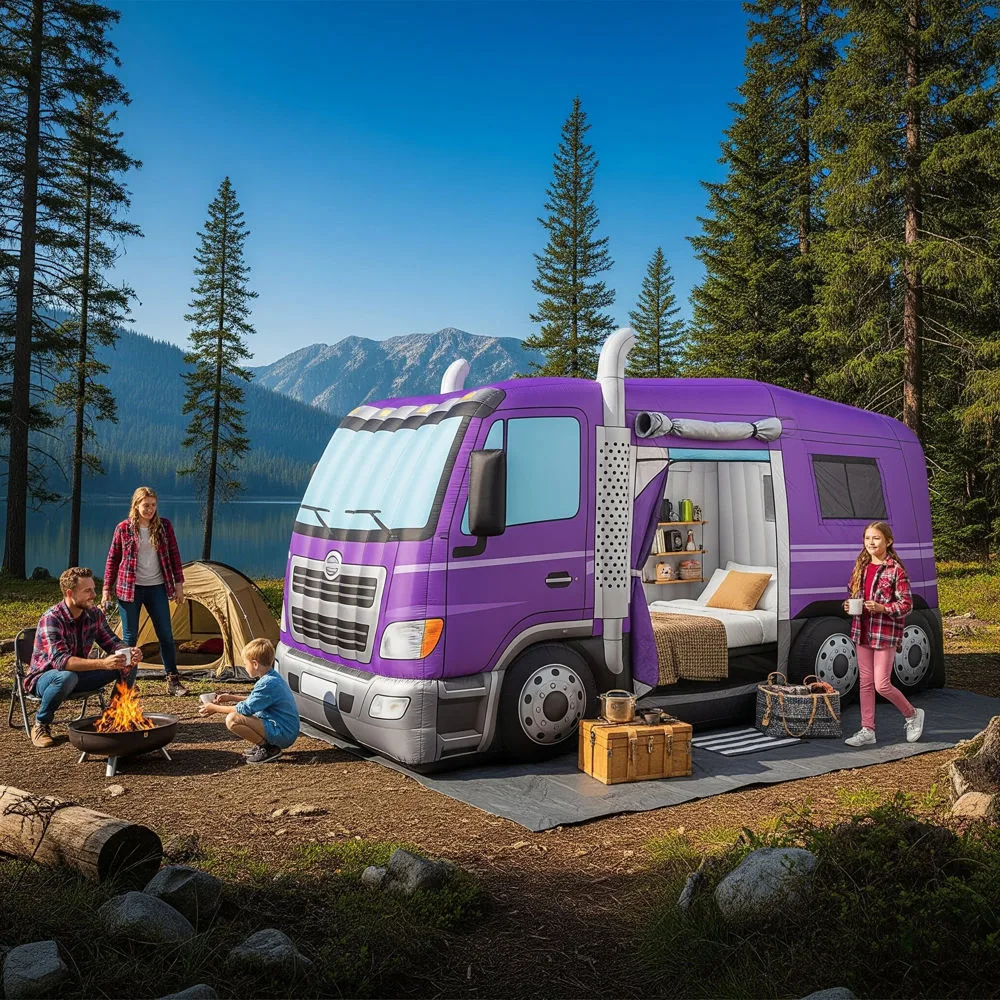
Leave No Trace Principles
Responsible camping practices are essential for preserving the environment and maintaining access to camping areas. Follow Leave No Trace principles, including packing out all trash and minimizing your impact on natural areas.
Choose established camping areas when possible, and avoid damaging vegetation or disturbing wildlife. Your actions as a truck camper reflect on the entire trucking community.
Sustainable Practices
Consider the environmental impact of your camping gear choices. Look for products made from recycled materials or companies with strong environmental stewardship programs.
Solar powered accessories and efficient camping stoves can reduce your carbon footprint while providing reliable performance. Water conservation practices are important, especially when camping in arid regions.
Future Trends in Truck Camping
Technology Integration
Modern semi truck camping tent designs increasingly incorporate technology features. Smart tents with integrated lighting, USB charging ports, and climate control systems are becoming more common.
GPS tracking and theft protection features are being integrated into high end camping equipment, providing additional security for valuable gear.
Improved Materials
Advances in fabric technology continue to improve tent performance while reducing weight. New waterproof and breathable materials provide better comfort while maintaining durability.
Eco friendly materials are becoming more prevalent as manufacturers respond to consumer demand for sustainable products.
Customization Options
Manufacturers are offering more customization options to meet specific needs of different user groups. Modular tent systems allow campers to adapt their setup for different situations and seasons.
Custom colors, logos, and features are becoming available for professional drivers who want to personalize their equipment.
Conclusion
The semi truck camping tent represents a perfect solution for drivers and adventurers seeking comfortable, affordable accommodation on the road. By transforming any parking area into a cozy outdoor retreat, these innovative shelters provide freedom, comfort, and significant cost savings compared to traditional lodging options.
Whether you’re a professional trucker looking to improve your quality of life on the road or an adventure seeker planning epic road trips, investing in a quality semi truck camping tent opens up a world of possibilities. The combination of cost effectiveness, enhanced comfort, and connection with nature makes truck camping an increasingly attractive option for many travelers.
Success with truck camping depends on choosing the right equipment for your specific needs, maintaining that equipment properly, and following best practices for setup and safety. With proper planning and quality gear, a semi truck camping tent can transform your travel experience, providing comfortable rest and memorable adventures for years to come.
The future of truck camping looks bright, with continued innovations in design, materials, and technology promising even better solutions for road warriors. As more drivers discover the benefits of truck camping, the community continues to grow, sharing knowledge and experiences that benefit everyone interested in this unique form of outdoor recreation.

